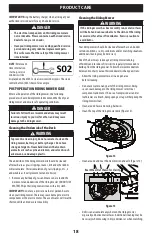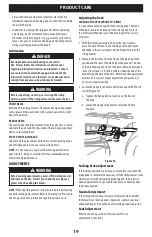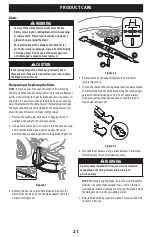
6
SAFE OPERATION PRACTICES
BATTERY SAFETY
1. Do not expose the battery to fire or to temperatures over 140°
F (60° C). Doing so could cause an explosion.
2. Handle battery with care. Do not short the battery with
conductive materials, such as rings, bracelets, keys, etc.
Shorting the battery may cause personal injury, damage to
the battery, or a fire.
3. Do not attempt to charge a cracked or damaged battery.
4. Do not use or charge a wet battery or a battery that shows
any evidence of corrosion.
5. Do not use a damaged or modified battery. Doing so could
result in a fire, explosion, or personal injury.
9. Never modify a plug, cord, or outlet in any way.
10. Ground Fault Circuit Interrupter (GFCI) protection should be
provided on the circuit(s) or outlet(s) to be used with this
charger. For an extra measure of safety, use receptacles
(outlets) with built-in GFCI protection.
11. Do not place the battery charger where cords might be
stepped on, tripped over, or subjected to damage.
12. Keep the battery charger and cords in a cool and dry area.
13. Keep the battery charger and cords away from all liquids.
14. Do not allow small metal items or material such as steel
wool, aluminum foil, or other foreign particles into the
charger port.
15. Do not probe the charger with conductive material. There is a
risk of electric shock.
16. Do not cover the battery charger. The battery charger
may overheat.
17. Do not allow the battery or battery charger to overheat.
If they are warm, allow them to cool down. Only charge
batteries in temperatures between 40° and 104° F (4.5° and
40° C).
6. Do not dispose of the battery in a fire. The cell may explode.
Contact your local authorized service dealer for proper
battery recycling.
7. Exercise care in handling batteries in order not to short the
battery with conductive materials such as rings, bracelets,
and keys. The battery or conductor may be hot and
cause burns.
WARNING
• The battery may present a risk of fire or chemical
burn if misused. Do not disassemble, overheat, or
incinerate the battery.
• Leakage from the battery may occur under extreme
usage, charging, or temperature conditions or if
the battery is damaged, crushed, or punctured.
This leakage indicates a failure of the battery and
the battery should be properly disposed of by an
authorized service dealer.
If the battery leakage gets on your skin or eyes, follow
these steps:
• Immediately wash the skin, flush the eyes with cool water for
at least 20 minutes, and seek immediate medical attention.
• Contents of open battery cells may cause respiratory
irritation. Provide fresh air. If symptoms persist, seek
medical attention.
• Ventilate the room and vacate the area if smoke and gases
are present. Gas and smoke in a confined area will present a
potential health risk.
• If the leakage gets on your clothing or shoes, remove, isolate,
and wash the contaminated clothing thoroughly.
Содержание 33 27JD Series
Страница 78: ...NOTES NOTAS NOTES ...
Страница 79: ...NOTES NOTAS NOTES ...







































